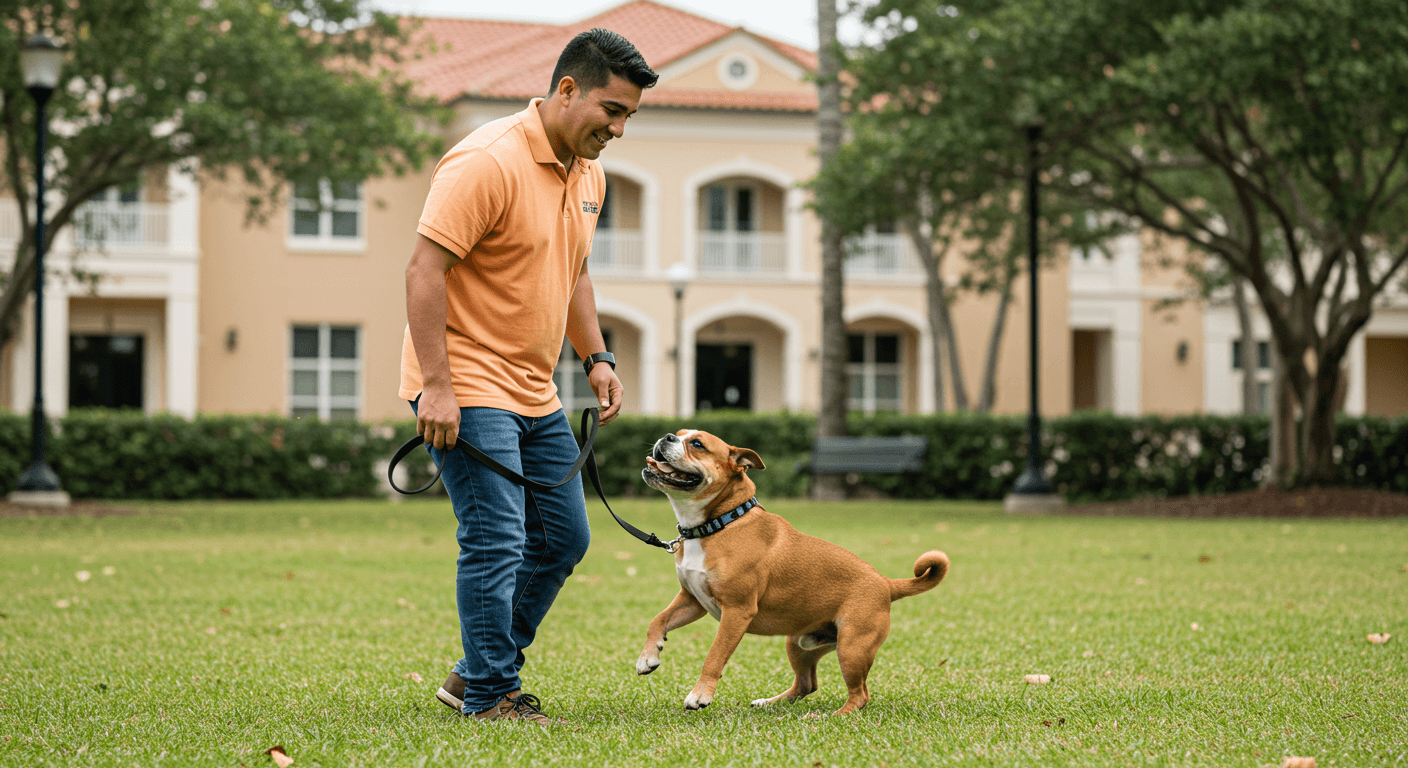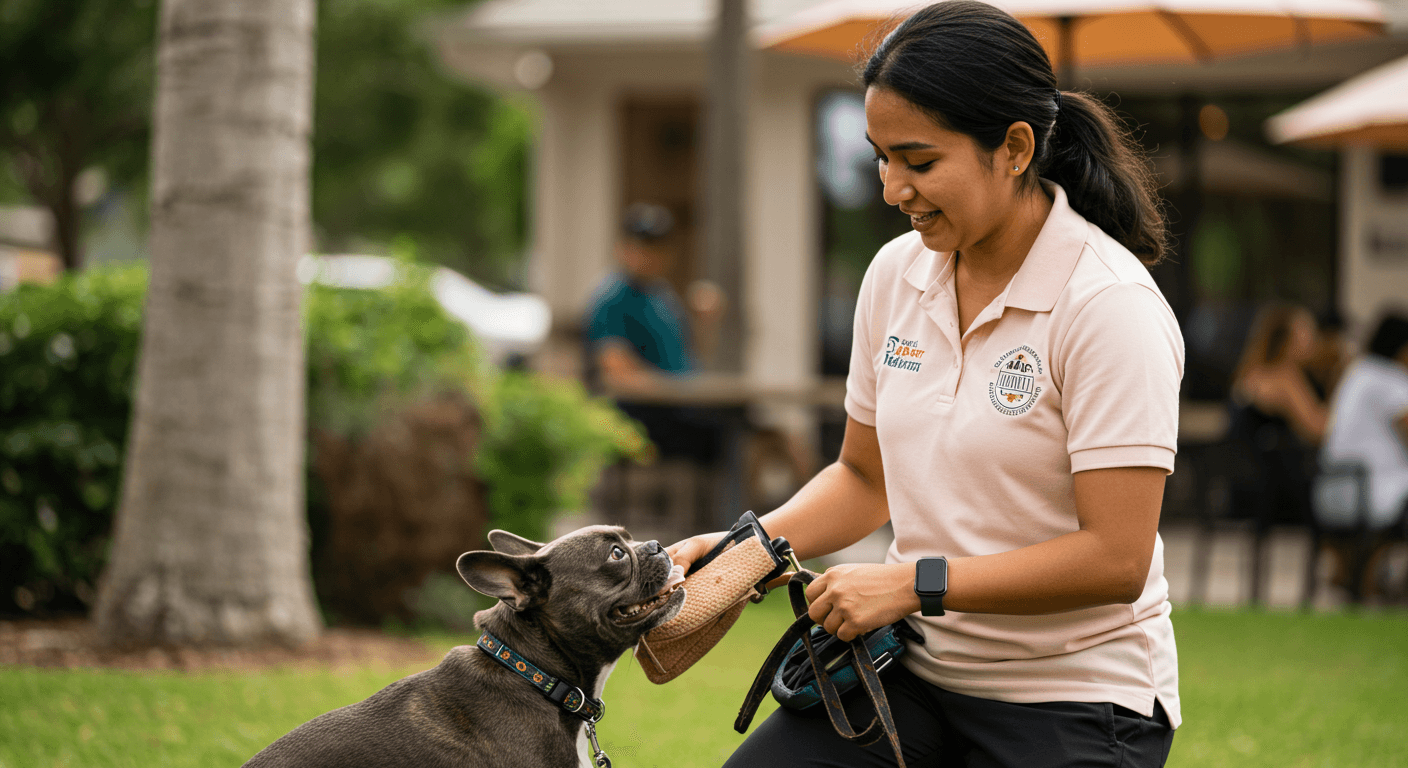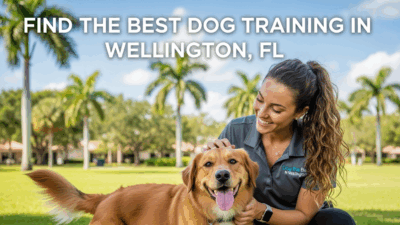Your Complete Guide to Choosing a Dog Trainer in Wellington FL and Surrounding Areas
Living with a dog in Wellington means navigating one of Florida’s most equestrian-focused communities, where your pup needs to stay calm around horses, handle busy trail systems, and behave politely at the many outdoor cafes and community events. Training your dog to walk past polo matches at the International Polo Club or stay focused during the crowded Winter Equestrian Festival takes more than basic commands.
Wellington sits in Palm Beach County, so most local rules follow county ordinances along with some specific Village regulations. When you find a professional dog trainer who understands these local details, you’ll get better results both at home and out in your community.
The village’s unique layout means your dog will encounter golf carts, horses, cyclists, and pedestrians all sharing the same paths. A well-behaved dog makes these interactions safer and more pleasant for everyone.
How to Choose the Right Trainer
Start by looking for someone who uses positive reinforcement training and can set realistic goals for your Wellington lifestyle. This means your dog should learn to walk calmly on the equestrian trails, stay focused near horses and livestock, and handle busy shopping areas like Wellington Green Mall without pulling or jumping on people.
Credentials give you a quick way to compare trainers’ experience levels. Common dog trainer certifications include KPA-CTP, CPDT-KA, or IAABC-CDBC for behavior problems. If your dog has serious aggression issues or reactivity around other animals, look for someone with CBCC-KA or a science-based program like CTC.
In-home dog training works great for puppy training, door manners, and neighborhood leash skills specific to your gated community. Group classes make sense once your dog can focus around other dogs, especially before you try busy spots like Village Park or Wellington Amphitheater events.
Ask about the trainer’s experience with horses and livestock if you plan to use the bridle paths or visit areas near the polo grounds. Not every trainer understands how to work with dogs who react to larger animals.
Common Dog Training Methods Explained

Reward-based methods build the trust you want while creating lasting behavior changes. They also help you follow Palm Beach County’s rules about keeping dogs under control in public spaces.
Basic obedience covers sit, down, stay, place, recall, and leash training so your dog can handle walks, restaurant patios, and park visits without pulling or jumping on people. These foundation skills matter even more when you’re sharing paths with horses and cyclists.
Puppy classes focus on socialization, potty training, bite control, crate comfort, and early leash work. Starting with short, positive training sessions prevents bad habits from forming in the first place. Wellington puppies benefit from early exposure to horses, golf carts, and the sounds of polo matches.
Behavior modification addresses fear, reactivity, resource guarding, or separation anxiety through careful desensitization and counterconditioning. For serious cases, ask if your trainer works with local veterinarians or veterinary behaviorists.
Private lessons and in-home sessions let you customize everything around your daily routines and your specific neighborhood environment. Day training can speed up results when you’re short on time or need help with complex issues.
Dog training classes help your dog practice good manners around other dogs and people. The best classes give dogs plenty of space, screen participants carefully, and teach calm behavior rather than just excitement.
Specialized training like therapy dog training or service dog training requires extra structure, public-access skills, and a very clear step-by-step training program. These programs take months of dedicated work with expert dog trainers.
Stay away from trainers who use fear, intimidation, or pain to get results. Humane methods are safer for everyone, easier to maintain long-term, and much better for keeping peace with your neighbors in Wellington’s close-knit communities.
Average Cost of Dog Training in Wellington FL (Updated for 2025)
Prices around Wellington and Palm Beach County depend on the trainer’s experience, how long training sessions last, and where the training happens. Here’s what most local pet owners are paying in 2025.
| Service Type | Average Cost (Wellington/Palm Beach County) |
|---|---|
| Puppy classes (4-6 weeks) | $175-$300 total |
| Group obedience classes (4-6 weeks) | $180-$325 total |
| Private lessons (60-90 min) | $125-$225 per session |
| In-home coaching packages (4-6 visits) | $475-$1,100 total |
| Day training (trainer works your dog + handoff) | $500-$1,200 per week |
| Behavior consult for reactivity/anxiety (initial) | $175-$300 |
| Board and train (2-4 weeks) | $2,500-$5,500 total |
You’ll probably pay extra travel fees for longer distances within Palm Beach County, and expect higher rates for complex behavior work or specialized training programs. Wellington’s location means trainers may charge less for local visits within the village compared to trips from other parts of the county.
Make sure you understand what’s included in dog training services, how the trainer tracks progress, and whether they offer a free consultation or free evaluation before you sign up.
Questions to Ask a Potential Dog Trainer
- What training methods do you use, and how do you keep sessions positive and low-stress?
- What credentials do you have, like KPA-CTP or CPDT-KA? Do you keep up with continuing education such as CPDT-KSA?
- How will you customize the training program for my dog’s specific needs and our Wellington lifestyle?
- Have you worked with dogs who need to be calm around horses and livestock?
- Do you offer in-home visits, group classes, or day training, and which approach fits my goals best?
- How will we measure my dog’s progress and know when to add more distractions?
- What are the total costs, including any travel fees, and what’s your cancellation policy?
- Do you carry liability insurance, and can you show me proof?
- For behavior problems, will you work with my veterinarian if needed?
- What should I practice between our sessions to help my dog keep improving?
Local Wellington Rules and Considerations
Wellington enforces leash laws and nuisance rules to keep parks and neighborhoods safe for everyone. Palm Beach County follows Florida’s public health requirements too.
Leashes are required in all public spaces except inside designated dog parks. Keep a standard 6-foot leash with you for village trails, parks, and community events. This is especially important on the equestrian trails where horses have the right of way.
Florida law requires current rabies vaccination for all dogs over four months old. You can get these through county clinics or your regular vet, and find more details through Palm Beach County Animal Care and Control.
Excessive barking can be considered a nuisance under Wellington’s noise ordinance, so work with your trainer on alert barking and separation anxiety before neighbors start complaining. Many Wellington neighborhoods have homeowner associations with additional pet rules, so check your HOA documents.
Florida doesn’t require special licenses for dog trainers, but trainers who operate commercial facilities may need general business licenses through the Village of Wellington. If a trainer offers board and train services with overnight stays, they may need additional permits.
The Village of Wellington has its own Animal Control Division that handles local enforcement and lost pet reports. Palm Beach County Animal Care and Control provides sheltering services and county-wide resources.
Local Wellington Resources for Dog Owners
These spots give you great places to practice polite manners, work on recalls, and provide safe enrichment for your dog. Always follow the posted rules and etiquette guidelines.
- Wellington Dog Park at Village Park offers separate areas for large and small dogs with water fountains and shade structures. Practice recalls and calm greetings during quieter morning hours.
- Okeeheelee Park Dog Park in nearby West Palm Beach provides fenced areas with agility equipment and separate sections by dog size.
- Wellington Environmental Preserve at the Marjory Stoneman Douglas Everglades Habitat welcomes leashed dogs on walking trails, perfect for building focus around wildlife and birds.
- Wellington Community Center often hosts pet-friendly events where you can practice socialization in controlled settings.
- Acreage Dog Park serves residents in The Acreage area of western Palm Beach County with fenced play areas.

FAQs
How much does in-home dog training cost?
Most Wellington trainers charge $125-$225 per in-home visit, with discounts available when you buy packages. Behavior problems typically start at the higher end of that range.
Is in-home dog training worth it?
Absolutely, because you’re working on problems exactly where they happen. Your trainer can fix door manners, jumping on guests, counter-surfing, and yard reactivity right at home, then step outside to practice leash skills on your actual neighborhood sidewalks or shared paths.
Can you pay someone to house train your dog?
Yes, many trainers offer puppy programs that include potty training, crate routines, and daily schedules. Day training can speed up the process while teaching you how to maintain the progress.
What is the 3-3-3 rule for dog training?
This is a helpful timeline for new or adopted dogs: expect about 3 days for your dog to decompress, 3 weeks to learn your routines, and 3 months to feel completely settled. Good training plans work with this natural adjustment period.
How long will it take to reach my training goals?
Most puppies and friendly adult dogs show solid progress within 4-8 weeks if you practice daily. Fear, reactivity, or aggression typically requires several months of careful behavior modification with gradual increases in difficulty.
What should I bring to group classes?
Pack a flat collar or harness, a 6-foot leash, high-value treats, water, and current vaccination records if your trainer requests them. Leave retractable leashes at home for safety reasons.
What’s the leash law in Wellington?
Dogs must be leashed and under control in all public areas, except inside designated off-leash dog parks. Keep that 6-foot leash handy for village trails, parks, and equestrian paths where horses have priority.
Do I need a dog license in Wellington or Palm Beach County?
Palm Beach County requires dog licenses for all dogs over four months old. You can register your dog through Palm Beach County Animal Care and Control with proof of current rabies vaccination. License fees are reduced for spayed or neutered dogs.
What shots does my dog need in Palm Beach County or Florida?
Rabies vaccination is required throughout Florida for all dogs over four months old. Your veterinarian may also recommend distemper-parvo, bordetella, and leptospirosis based on your dog’s lifestyle and exposure risks.
Are dog trainers required to be licensed in Wellington or Palm Beach County or Florida?
No special trainer licenses exist in Florida. Trainers follow normal business regulations, but if they offer board and train services or operate kennels, their facility may need to meet state and local requirements for animal boarding facilities.
Where can I practice off-leash recall?
Use fenced dog parks in Wellington or nearby West Palm Beach to keep things safe and legal. Wellington Dog Park at Village Park and Okeeheelee Park Dog Park both allow off-leash play within their fenced areas. Try visiting during quieter hours when you’re starting out.
Which dog parks allow training around Wellington?
Wellington Dog Park at Village Park is your main local option, with separate fenced areas for different dog sizes. Okeeheelee Park Dog Park in West Palm Beach and Acreage Dog Park in western Palm Beach County are also solid choices for practice sessions.
What beaches or trails allow dogs for training?
While Wellington doesn’t have beaches, leashed dogs are welcome on trails at Wellington Environmental Preserve at the Marjory Stoneman Douglas Everglades Habitat. These trails are perfect for teaching calm focus around wildlife, birds, and other walkers. The village’s equestrian trails welcome leashed dogs but remember that horses always have the right of way.
How do I help my dog stay calm around horses?
Start by exposing your dog to horses from a safe distance where they can see and smell them without reacting. Reward calm behavior and gradually decrease distance over multiple sessions. Many certified dog trainers in Wellington have specific experience with this challenge since it’s so common in the area.
Can I bring my dog to polo matches or equestrian events?
Most equestrian venues in Wellington allow well-behaved dogs on leash, but check with each specific venue before attending. Your dog should be comfortable with crowds, loud noises, and the sight and smell of horses before you attempt these environments. Work with a trainer on socialization if your dog shows any reactivity.
What if my dog has separation anxiety in our Wellington home?
Separation anxiety requires a structured behavior modification plan that gradually teaches your dog to feel comfortable alone. A certified dog trainer or veterinary behaviorist can help you create a custom program. In severe cases, your veterinarian may recommend anxiety medication alongside the training program.
The right combination of thoughtful planning, humane methods, and consistent practice around Wellington’s unique environment will help your dog become a confident, well-behaved companion. Whether you’re navigating busy equestrian events in neighborhoods like Versailles or Saddle Trail Park, or simply enjoying quiet walks through Olympia, a top dog trainer who knows the area can make all the difference in helping your dog succeed.
